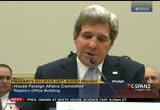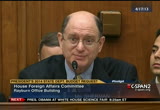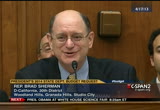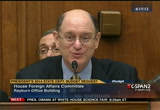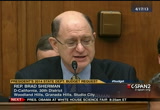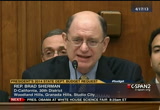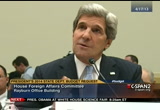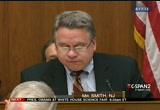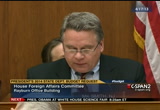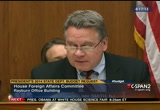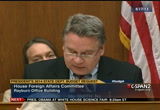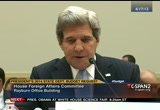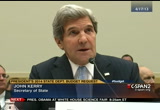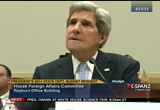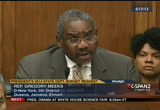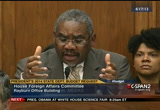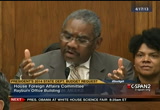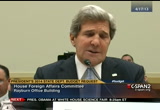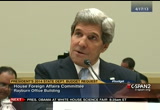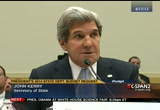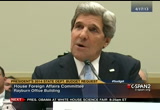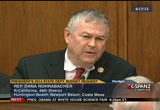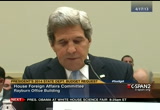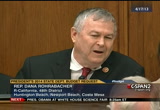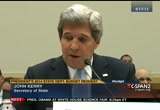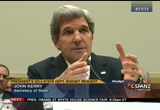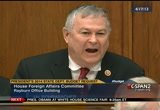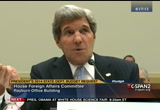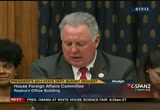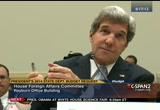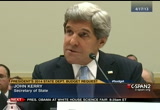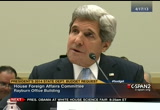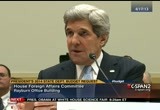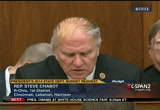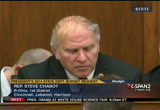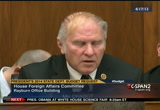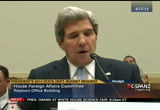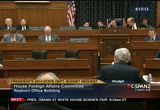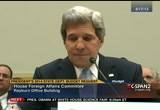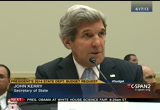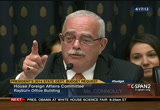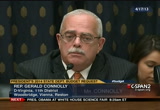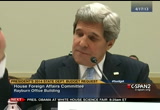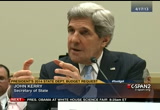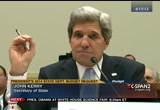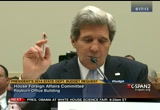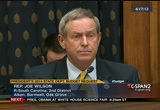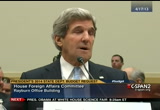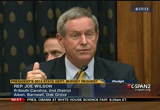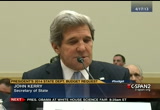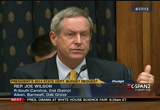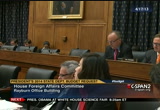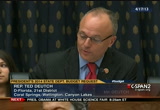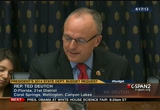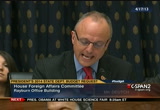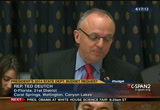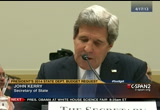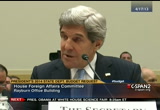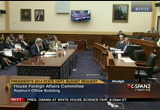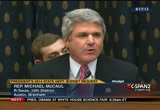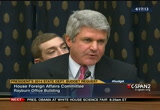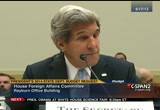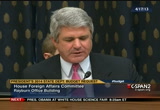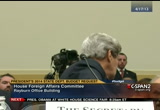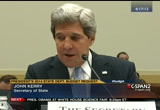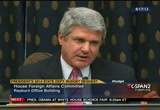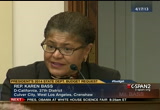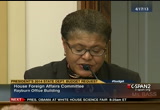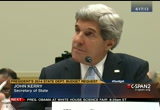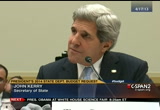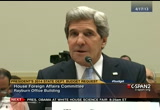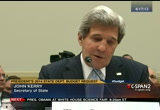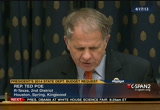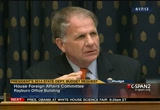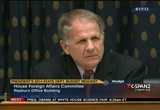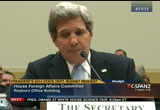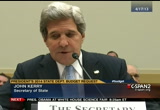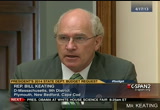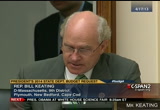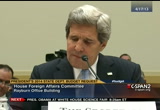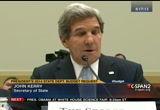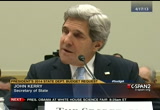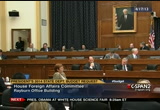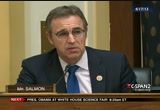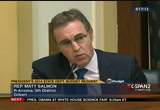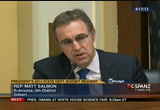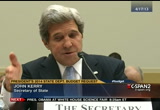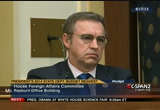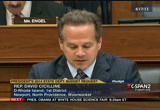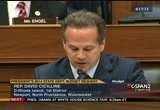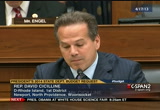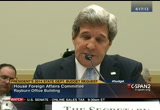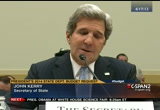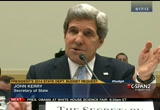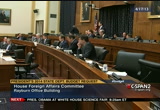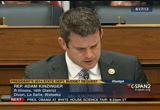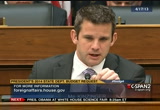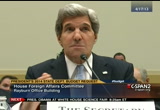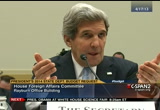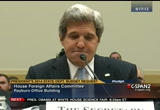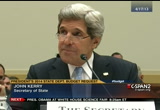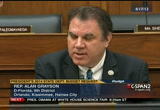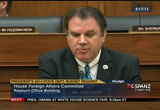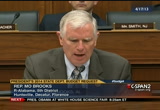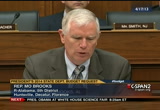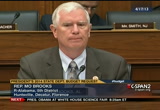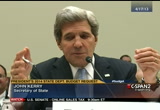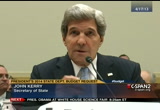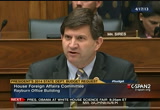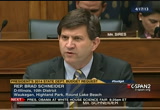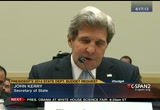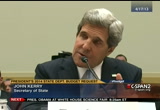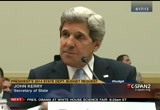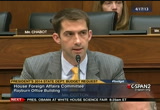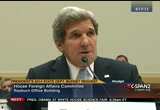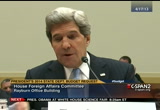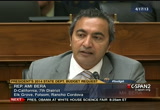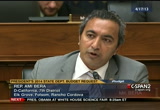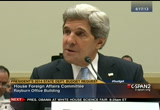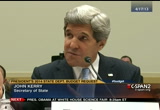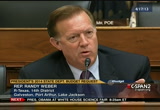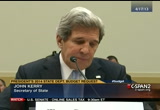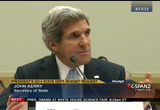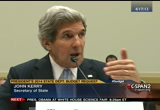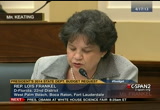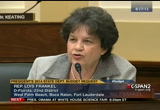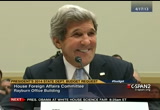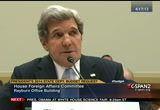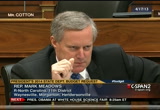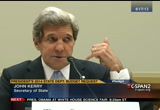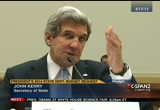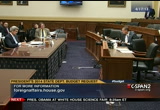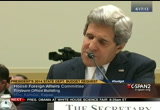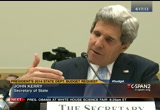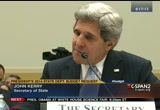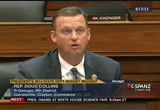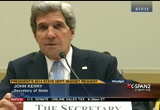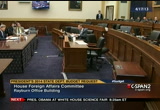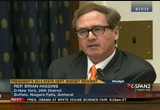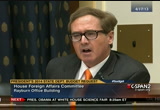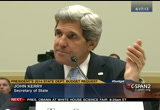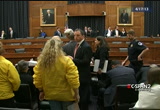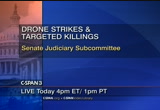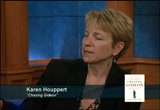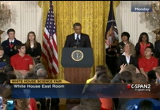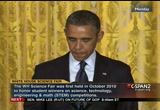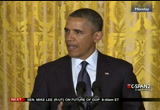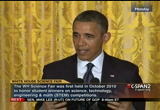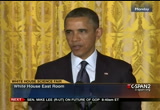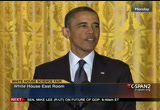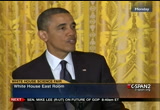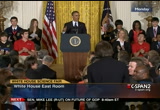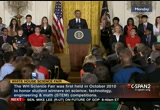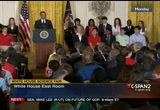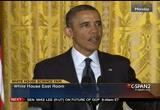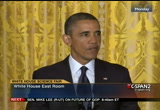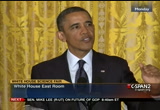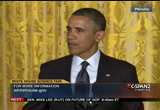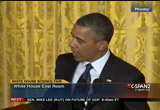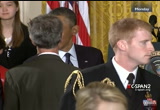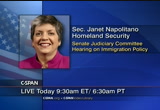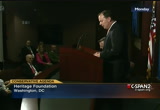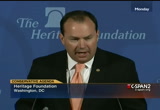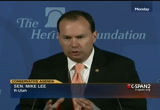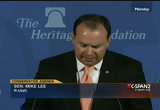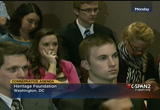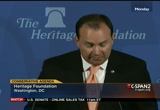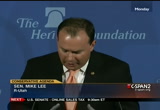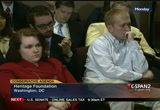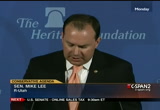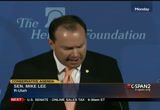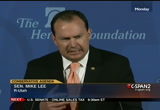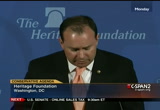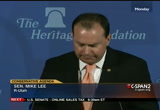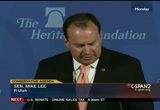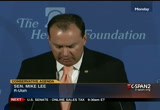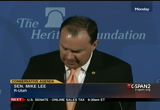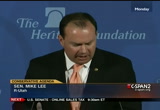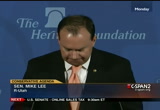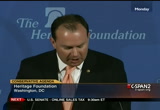tv Today in Washington CSPAN April 23, 2013 6:00am-9:00am EDT
6:59 am
>> in written questions after hearing i asked the secretary who in the state department saw this cable and what specific actions were taken in response. i was disappointed quite frankly with a response, and i hope you can do better. her response simply identified personnel in the bureau of diplomatic security and the
7:00 am
bureau near eastern affairs as having reviewed the cable. but he did not say who received the cable specifically and what specific actions were taken in response to what i consider to be a cry for help from our ambassador to our state department in washington that possibly could have prevented the tragic event from occurring. mr. secretary, can you tell me which individual or individuals saw this cable and what specific actions were taken? >> i can't tell you which ones reviewed because there's a process going on right now which is supposed to come to me very shortly. which is an internal review and analysis of who did what and who may have or may not have made the right judgment or no judgment or whatever. i have not seen that yet and i
7:01 am
don't want, you know, i'm not going to prejudice anything that i have to do here. i think the chairman raise the issue, people still working, there's a process, there's a due process, there's an internal process. it will come to me and i will have to make some kind of decision. i'm not even sure exactly what the parameters are of that yet because i've waited until it's right and it comes to me. but i know that it's coming and i want to know exactly who made what decision or didn't and i will have some responsibility to act one way or another regarding at. >> can i have your assurance you will let this committee know which individuals actually received that cable? >> sure. >> and what response was taken? >> you have the right to know. >> one last question. this is sort of a mixture of state department and the department of homeland security, but recently the global entry program was offered to saudi arabia. saudi arabia is where 13 of the
7:02 am
19 hijackers came out of. i can't think of any greater threat than the saudi peninsula with yemen right south of saudi arabia. for the life of me i don't understand why saudi was given preferential treatment over our nato allies who fought alongside, with our soldiers and fought and died and are wanted in iraq and afghanistan, and instead of rewarding nato, or nato allies with global entry, we are rewarding saudi arabia. i personally, i'm not trying to be political. i think it's a dangerous policy and could result in american lives being killed. [inaudible conversations]
7:03 am
>> i'm just trying to determine, and i apologize, but i'm trying to determine who actually makes the final decision on that. and i'm told it's an interagency process, which is, doesn't satisfy me and won't satisfy you. i need to find out where the final decision gets made. but, but, and i want to say this in fairness, saudi arabia has cooperated with us and is cooperating with us in extraordinary ways. there are plots that we have uncovered that never come to light and won't because of saudi arabia's assistance. saudi arabia is providing invaluable assistance in the counterterrorism efforts in the arabian peninsula. and saudi arabia has an extremely effective and has entered into with us a major capacity to determine security.
7:04 am
and as you know in the global entry program, you go through a huge background analysis and checks. plus, you have made your biometrics, component. i went through this a year ago so that i could join it, and i remembered coming in, every evey fingerprint, every sort of aspect of you is proctology iced and so you wind up with a pretty good sense of who is who. so i personallpersonall y have confidence in saudi arabia to do that and i think i wouldn't prejudice them automatically by virtue of what happened that i would look at the procedure and check and see what goes into it in fairness. >> i agree. my time has expired but i would say extraordinarily is with respect to intelligence. i agree with you on that point. but i do think it mayors review by your department as well. >> i will check up on the final review but i have great confidence in the saudi arabian
7:05 am
contribution, the kingdom has been very helpful in any numbers dashing any number of ways. >> mr. secretary, going back to your earlier comment you reference the benghazi review, can you provide us a copy of that internal review once it is completed? >> i don't know. honestly i just don't know whether there's a privacy internal administered restriction that we all have given through congress. i don't know what the law is spent we will make a request on that and appreciate your follow up on it. we go now to karen bass of california. >> thank you, mr. chair. i want to congratulate secretary kerry on your appointment, and also join my colleagues in expressing my condolences. >> thank you. >> i look forward to working with you, and especially working with the committed men and women at the state department. i have to tell you that i've
7:06 am
really enjoyed working directly with the state department and i'm honored to have an excellent pearson fell in my office who i am looking forward to continuing to work with me. as the ranking member of the african subcommittee all wanted to share with you several priority issues i hope you will consider. first of all come u.s.-africa trade relations. number two, the importance of development assistance programs, including global hiv/aids funding through pepfar. number three, support for peacekeeping operations. as you know the u.n. is considering establishing a peacekeeping force and mali and there's already a substantial peacekeeping mission in the drc. i know you're aware that six of the 10 fastest-growing economies in the world are located in sub-saharan africa, and it is my hope to the extent possible that the state department will prioritize trade with the african nation. you should know that we have a bipartisan bicameral effort working in conjunction with chairman smith to quickly put
7:07 am
forward a renewal of the africa growth and opportunity act. so i have four questions i would like to ask you. i wanted to know what steps are you taking to focus on africa's extraordinary growth potential? what are your thoughts about the u.s. appointing a special envoy to the drc? does the request for peacekeeping operations accurately reflect the growing needs on the continent? and can you comment on the significance of the 6% cut to usaid hiv/aids funding? >> thank you very much, congresswoman. let me emphasize first of all that we were really pleased that pepfar was able to be held whole. i think that's vital. i have personally visited, i was in durbin, north of durbin, in the mountains watching of the program is being effectively
7:08 am
administered, and the difference it has made. we are looking at, as secretary clinton testified, we are looking at having an age regeneration as a result of what we've done and we should be very, very proud of that. that will continue completely. with respect to the drc, the answer is yes, we are going to appoint a great lakes special envoy. and shorter i think you'll be very pleased with the presidents of choice. that is also caught up in the vetting process right now. but i'm very anxious to do that because i believe that without a great deal of input, one could deal with in 23 and encourage rwanda to perhaps take a different approach to help the president to be able to deliver better governance. there's a lot we could do but we've got to be able to be there and be engaged.
7:09 am
and do that in an entity or question, is the level of funding sufficient? i will tell you, the answer is it's what we can ask for under the budget constraints we are living with, but i don't think any but he should kid themselves that we're stepping up to do what is possible and what is perhaps morally critical with respect to developing an indigenous african capacity to respond to the au or otherwise to some of these crises. and as you know, we have a number of u.n. efforts there now that are just not yet sufficient to be able to do the job. so we have some development work to do in that, and it would be such a return on investment. there's a lot of this violence is against him. it's just criminals. they run around at her unleash. and read the ability to provide some order i think we could do a lot more for economic
7:10 am
development and peace. >> absolutely. and mr. secretary, before it finished i really think we need to just change our perspective and how we view the continent. with some of the world's fastest-growing economies on the continent, i would like for you to address the significance or the priority spent six of the 10 or 12 fastest-growing countries in the world are in africa. and i want to say to our colleagues here, we all are concerned about our economic future. china is investing more in africa then we are. it doesn't have to be a zero-sum game, but we have to recognize where our future economic interests and capacity may lie, and i think that's why these investments are so small against the return on investment in the long run. and africa, we need to be deeply engaged in an intend to be. the president will travel there. we have a lot to do. >> thank you. >> we will go to mr. poe.
7:11 am
>> thank you, mr. chairman. thank you, mr. secretary for being here. i want to first of all thank you for your help last year on the foreign aid transparency act. if we get this passed this year it will do a lot to explain to the american public why we give foreign assistance if held accountable by some type of legislation so thank you for your work on the. i want to talk about for different issues. north korea, benghazi, the mek, and also pakistan. i read recently that when you were in china that you suggested the united states would reduce our missile defense system in asia for exchange, in exchange for chinese help with north korea. it seems to me that even though we're being threatened by nuclear attack by the north korean government, first of all,
7:12 am
is that an accurate statement? and if so, explain that if you would. >> no, not an accurate statement. i think it was corrected while i was over there. it was reporting to that effect. there was no offer, no deal, no contemplation of it. what i did say publicly and i will say it again, is that the president took specific deployment steps of missile defense in direct response to north korea. and it stands to reason that if the north korean threat disappears, there would be a logical question of whether or not th that same level of deployment is necessary. it's all, i stated, was sort of a fact based on the rationale of deployment itself. >> do you think the united states should give aid to north korea of some type to temper their saber rattling, which they seem to do, about this time ever you? >> no. >> thank you for this comment. i'm glad i agree with you
7:13 am
totally. also, as all have said regarding boston, and chairman mccall especially, the activity of our first responders was textbook, but also the people how they, they came out of the stands, down the streets to help other wounded and critically wounded citizens. and noncitizens as well. people from all over the world. i especially am encouraged by the cowboy from costa rica that is now an american citizen, how he helped with one of the runners. and that's what some of the best part of the american people. you mention to bring the perpetrators to justice, and they will be brought to justice. but buttressing in on benghazi, it's been seven months since that attack.
7:14 am
people are frustrated. members of congress are you frustrated. they want, 100 want a select committee to study benghazi. of course, many of them are not on any committee of jurisdiction but they want a committee. i hear comments all the time, why haven't we captured somebody that did these bad things in benghazi? reports indicate that the libyan government really won't do anything because, reportedly, some of the groups, the militia groups that support the libyan government may be involved in the attack. would you comment on that, if you can't? >> i don't have any knowledge whatsoever. let me just say one of the first things i did when i came in was called director mueller at the fbi to get an update on this. because obviously, you know, there's no family in america that wants justice more than the
7:15 am
state department family, believe me. so i wanted to know where we are, and i think we are making progress. now, there's video as you all know. we have identified people, and they are building a case. we are going through the tedious, laborious, and very difficult process of gaining evidence from the part of the country which is dangerous. and working in a place where the standards are different and the expectations are different. we are working through that, but i can guarantee this. i think all of you know because of bob mueller's service, and the extra year is that people passed a law to allow him to serve, there is no more dedicator are capable leader in the fbi, and there's nobody more committed to do this. so i have confidence in the. i also confidence in something else. this president of the united states made it clear once before that he would do what was necessary to bring somebody to
7:16 am
justice. and i guarantee you he has made it clear yet again that we will find justice here. and the president will do what is necessary. our hope is to work with the libyan government to do this thorough process. >> i will submit further questions for the record, mr. chairman. >> mr. tierney. >> thank you, mr. chairman. thank you, mr. secretary for being a. i know that both of us, although we're here, part of us are still back home in massachusetts this morning. but getting to the theme of this morning's hearing, your theme of small smart investment is right on point. i couldn't agree with it more. one of those areas that the administration and you have been involved with, personally and secretary clinton has been involved with has been really dealing with issues like national action plan for woman, peace and security in the world. i think that we can't approach
7:17 am
the broader issues of poverty and the rule of law and education and health care around the world without dealing with these issues. they are core to any advancement in that area. furthermore i think they are the smartest way for some of these invest for our dollars and to be effective. so i would like you to just do two things, if you could comment on. one is, generally comment on your ability to deal with these gender equality and advancement issues with women around the world. and number two, particularly gender-based violence, you know it in your capacity, you knew it when you were a prosecutor as i did. they know no borders abound when you're dealing with violence, based on gender-based violence. and internationally the violence that sony women experience take many different forms from rape to early forced marriage to harmful traditional practices
7:18 am
that occur such as genital mutilation, honor killings, acid violence, sexual violence and contact, and i could go on and on and on. but can you comment on the department's first time ever strategy to prevent and respond to gender-based violence globally? those are the two things i would like you to comment on. >> thank you, congressman. it's good to see you. thanks for our shared feelings about what's happened up in boston. secretary clinton did a good job of putting this issue squarely on everybody's agenda, and i'm determined to make certain that we live up to that standard, if not exceeded. and i think we're in a good start to do that in terms of trafficking issues and other
7:19 am
things. but in london last week at the g8 ministers meeting, foreign minister hage of great britain made the centerpiece of our meetings sexual violence as an instrument of war. and we had a meeting, we had outside representatives coming in who helped to raise the profile of that, and in my judgment, it was a very valuable moment for people to realize that this is going to be held accountable, as a war crime. and that we're going to keep this gender-based violence front and center as we go forward. i would also say to everybody, when i was in afghanistan a couple weeks ago, when my control officer, she helped put together a remarkable meeting of 10 entrepreneurs, 10 women in
7:20 am
afghanistan who are struggling against all of the resistance, culturally and historically in that country, to stand up and start businesses and help girls go to school, help women be able to be entrepreneurs. a remarkable process. and the courage that they exhibited deserves everybody support. it will certainly get ours in the state department, and we are going to continue this in many, many different ways over the course of next year. i think you'll see us continue. >> in terms of accountability, mr. secretary, can that also included some conditions that might be tied to age, to some extent? >> you know, congressman, there are some places that i think lend themselves to the kind of conditionality, and there are others that just don't. i don't think there's a blanket cover all way of explaining, you know, a set of standards that's going to apply it everywhere. in some countries the standards
7:21 am
actually can be counterproductive and you don't get done what you're trying to do. it truly depends on what is the package, what's the nature of the program. and i think you have to be pretty customized in that approach. >> thank you. mr. chairman, as i turned back do i do want to thank the members of the committee as well. as the members that have been talking to on the floor for the genuine and heartfelt concern about what is occurring in boston. i know we're all in this together, and i want to thank the secretary for his remarks. >> thank you very much, congressman. >> we go now to matt salmon, chairman of the western hemisphere subcommittee. >> thank you, mr. chairman. mr. secretary, welcome. first of all i would like to see that several written questions that were put together by 700 retired special forces operators that are in regard to benghazi. and i would just like a written
7:22 am
response on that. also, you've urged us to review the video from the attack of that night. we've requested that video, but the department has not provided a. when i mean we, the committee speak we don't have a. i think, i saw in a classified briefing. i believe it may be the agency or something spent would it be possible for you to take measures to ensure that we do get it? >> i will find it where it is and what the deal is but i'm surprised. i would think -- >> we have requested that they do but it has not been provided. >> okay. we had all members briefing i'm reminded in the senate and it was shown there. >> [inaudible] >> there was a meeting in a house which did show what speak if we could get that as a committed would ask him helpful. >> mr. chairman, do you know which committee would have posted that lex all members? maybe the leadership did.
7:23 am
but i'm confident, look, every member who was there sought. and if you haven't seen unconfident people will make arrangements for you to see it. >> great. i've a few questions regarding the western hemisphere and energy issues. as the chairman mentioned on the chairman of the western hemisphere committee, and i'm very interested in what the next move is going to be from the administration regarding the xl pipeline. i believe that it's been documented over and over and over again, the jobs that will produce, the benefit to our economy. your state department has said that there is no significant greenhouse gas issues with it or problems with regard to global warming. and so i'm kind of wondering why the administration continues to stall on that. also regarding liquid natural gas, we have an overabundance of
7:24 am
lng in this country, and a great opportunity to export especially to the caribbean. with the current economic problems in venezuela, and i think their diminished capacity to provide this great commodity. we have a phenomenal opportunity again to provide jobs in the united states and export the president said it wants to double our exports over the next friday's. i wholeheartedly endorse that idea. it's wonderful. here's an opportunity to actually put our money where our mouth is, and i'm wondering what it's going to take to get the department of energy to get -- so we can get on with exporting that come especially to the caribbean. and then finally i am a strong supporter of the transcontinental carbon, hydrocarbon agreement with mexico. i think it provides yet another wonderful opportunity. the united states and america to enter into a great economic joint venture, as well as make
7:25 am
the western hemisphere energy independent which i think it's a great goal. we have some great opportunities i think to do economic activities with our partners here in the western hemisphere, but i think it's time for us to move forward with it. i have met with some of your personnel, and they've submitted language that is acceptable. i would like all hands on deck from your department to help get that done now. thank you. >> well, thank you very much. thank you very much, mr. chairman. i, let me begin by saying first of all, there's no, i assure you, there's no stalling going on. the law is being followed. we are just following the law. we have a procedure that has to do an eis. the eis was improperly contacted up. the eis was done. and we have a public reporting period. that public reporting period is
7:26 am
going on right now. then after the public reporting period there's an option. it's all under the law. to perhaps get more information is there some reason the public comment required it, there's a determination of public interest and then ultimately it will come to me. but it's not right, it's not there and i am staying as far away from as i can them so that when the appropriate time comes to me, i'm not getting the information from anyplace i shouldn't be and getting engaged in a debate at a time that i shouldn't be. but we are following the legal procedure that is required. i assure you. secondly, regarding lng and so forth, look, i spent a lot of time on energy and climate and so forth when i was in the senate, and i would love to see the western hemisphere be energy independent. it's not a dream. it is conceivable that it could happen. you and i might have a slightly different sense of what the mix
7:27 am
of energy ought to be and how you might achieve it, but -- [inaudible] >> it is doable and i think it's worth us trying to proceed. i think there's a canada-u.s. mexico/latin america, central american component to this which is really worth exploring. much more vigorously and i'm prepared to do that. >> we go now to mr. sosa leaning of rhode island for five minutes, and afterwards we'll go to three minutes per member. >> thank you, mr. chairman. welcome mr. secretary and thank you for your continuing service to our nation. i, too, want to extend my controls is to you for the recent loss at the state department. i know i speak for all rhode islanders when i extend our condolences for the residents of the city of boston and of massachusetts. and i express they will continue to remain in our thoughts and prayers. i would like to also add my voice to the priority that was
7:28 am
set forth by my colleague, congressman bass, about the continent about the importance of remain fully engaged in that region of the world and please do your response to the. and with your indulgence i will submit written questions with respect to the status of the implementation of the recommendations of the accountability review board as they relate diplomatic security, question regarding the waiver program for portugal, and the air force base and impact of there. a question regarding armenia, particularly -- a question about a long-standing relationship and the state department role in protecting lgbt individuals and human rights of those individuals all around the world. but i would like to ask you today, mr. secretary, to stick it to specific areas, syria and north korea. as you know, mr. secretary, over a million refugees are currently left the area.
7:29 am
in january -- one half billion dollars in in managing assistance, but only a small percentage of countries have made that pledge a fulfill the pledges would like you to speak to what efforts are underway to usher the kuwait, saudi arabia and the eu in particular are making good on their commitments and what coordination is underway that donor countries to assure that assistance is reaching the affected individuals. i would also like your thoughts on whether not we are considering closing these hearing embassies here in united states and what the rationale keeping that relationship ongoing. and, finally, on the issue a series of like you to speak about what efforts are being made with respect to protecting searing girls and women in the refugee camps. we've seen some recent reports, again, that talk about sexual violence in exchange for money for family members in exchange
7:30 am
for young women being forced to marry. and so the sexual violence in these refugee camps isn't a particularly important issue. and suddenly i would ask you to talk a little bit about what your recent trip to seoul and tokyo might have contributed to thinking about what's happening on the korean peninsula, what your assessment of what's likely to happen, what we might able to as members of congress to help bring stability to that region of the world and to protect american ashes again this on the korean peninsula. >> well, thank you, congressman. good to see again at appreciate the questions. on syria, let me just say very quickly, we are really in touch very directly with these that donor countries. as i said we have given $385 million to the refugee issue. we are nearing the million mark over, the fourth largest city in
7:31 am
jordan today is a tent city. it's a refugee camp. and you could imagine the destabilizing impact and the problems with the jordanians who have other issues, challenges economically. so this is a big deal. in lebanon, you don't have camps. in lebanon, the refugees are spread throughout the country but as with art they may be as much as 10-20% add-on in terms of population. and then in turkey, in a very significant number of refugees in addition you also displaced persons within syria itself. so this is reaching a major humanitarian crisis level, and it's one of the reasons why we're going to meet in istanbul this weekend, as some of the donor countries will be there. but none of us want to sit around and simply see this refugee crisis grow and grow and
7:32 am
grow, and ultimately wind up with an implosion of the country itself. that may happen. i'm not going to sit here and tell you that we can prevent that. it the best shot at preventing it is to try to get to the negotiating table to get the geneva communicate implemented so that you can save institutions of the state, not wind up with an enclave state with huge instability and problems with extremist groups that have grown stronger as a result of this conflict. so time is our enemy. sooner is better in terms of getting to the table and conceivably getting some agreement. just very quickly because i know that apple has run. on north korea and the peninsula, i will just repeat again, president park has a new policy called trust politic, and she wants to reach out to the north. she can't do that in the middle of this kind of process. my hope would be that the chinese will come to the table in a way that they never have before. that we can work with the
7:33 am
chinese to redefine what's in all of our interests, which is a kind of stability in the peninsula moving north to denuclearization, and ultimately hopefully and integration into the community of nations. based on economic reform, which china, the united states, others could become engaged in. and that could ultimately even open up the possibility of president parks outreach to be able to have an impact. absent china coming to that table, i believe kim jong-un calculates literally calculates that i can get away with anything if china isn't going to hold me accountable. and so that's where we are stuck mr. adam kinzinger. >> thank you, mr. chairman. thank you mr. second your trick since my time as they cut down on what to make a few brief comments and a couple of very
7:34 am
brief questions. first off i wanted to say i was one of six republicans to support the president in libya. i support his decision to go into. i think it was the right thing to do. i believe, you mentioned in your testimony in the strength of america and that america cannot retreat from the world even at times will be faced tough budgets and everything else. and i'm glad to hear you say that. where i was dismayed in the libya situation though and what i've seen since then is the study of america leading from behind. entity strategy that i know was mentioned a couple times in passing, but i worry we are now trying as a nation to be more of a leader from behind and i believe personally that went america retreats from the world are retreats from the leadership role of the world, that chaos ensues. and so it's an area, i want you to address that i want to make a couple of quick comments. you mentioned i think in one of your, and your senate confirmation hearing that you hear from diplomats, they went if the united states can continue to deliver but at appreciate that, and i wonder if that is related to the new strategy of leading from behind
7:35 am
and not necessary a financial issue. i believe one of the greatest mistakes we have made in the last few years was not leaving a lake behind force in iraq, and i believe that now what we're going to see in iraq actually frightens me and i know y'all are doing great work there and i want to be very clear that the department of state has a strong presence in iraq and i appreciate that. but i believe we did not leave behind american troops was a major mistake and that turns into afghanistan but as we are looking at winding up afghanistan, a concern i have, the funding for training and education, 95% of soldiers are reported as a literate excellent question to specifically, first off, to address the leave -- the lead from nine strategy and i see, and suddenly from afghanistan. are weakened afghanistan. are we to be positioned at the present timetable for withdrawal which i believe is basically based on an arbitrary date, but are we in a position without a strong u.s. mr. president after 2014 to lead behind an afghan
7:36 am
military that can defend itself against a resurgent taliban? >> to very good questions. let me begin. i'm really happy to have this opportunity. let me kill this idea of leading from behind. i don't know where it comes to but i don't know what it means. well, i don't know how you lead from behind. if you're leaving, your leading. >> it confuses me too, sir. spent just a minute. i believe this president lead on libya. the fact that you decide not to put your boots on the ground doesn't mean you're not leading. there are different roles for different people to play. i respectfully suggest that almost every member of this committee would've said i don't want boots on the ground in libya. i also believe most people would set i do want on the ground in syria. that it doesn't mean we are not leading. we are leading. the president sent me to rome to bring together, together with our italian friends, the core
7:37 am
group of angry out what we're doing and would lead the effort to try to get greater support. i went to turkey. i met with foreign minister and the prime minister and we agree there at the president's instruction to see if we could put together an additional effort with respect to see. that meeting will take place this saturday. that's leadership. i believe the president has led from the beginning and helping to put the syrian opposition on the map, to get it recognize, to have th the paris me, the london income us a quick meeting in rome and so forth and to me that his leadership. so put it behind. i just going to say one word on afghanistan. the whole purpose of our policy today is to train and equip the afghan army to be able to fend for itself. most of the reports, colleagues have been traveling there, friends from the senate who told me they went over recently, were encouraged by what they've seen
7:38 am
the afghan army capable of doing. you don't see major assaults of the taliban against the army. you see people blowing themselves up. you see cowards coming out or people convinced, young children, 16, 17 years old to go blow themselves up. you don't see the leadership blowing themselves up ever. so i think that the fact is that what we are seeing is a kind of desperation on the part of the taliban, and hopefully in this fighting season we will see what the valley and capacity of the afghan army is a, and in the next fighting season. we still have to fighting seasons to see how this army develops. and as to the leading of the troops in iraq, look, the iraqis would not give our troops immunity. we speak i don't think we pushed very hard for that, mr. secretary. >> if the members can be brief with her questions, a little icon, we can get through all of the members here. alan grayson of florida.
7:39 am
spent as brief as possible, and for all wanted to ask you a few questions about the visa waiver program. are you for murder in general with the program? >> in general, yeah, that's a pretty good way to describe it. >> formerly the ministry had the authority to add countries to the visa waiver program, and now it does not. we like to see that authority on behalf of the administration restore? >> which authority? >> the authority to add the country to the visa waiver program which allows qualifying citizens of this country to come to the united states -- >> sure. i think of people qualify, we have a standard as you know the people are supposed to meet in order to be able to qualify for it. sure. look, you're not going of every country in the world being visa waiver for obvious reasons, but where people can meet the standards of requirement with respect to the right of refusal, which is a key standard, we are all for it spent would you like
7:40 am
to see strong strategic allies like israel and brazil and poland reward for their cooperation with u.s. foreign policy by included in the face or -- visa waiver program? >> yeah, but i'm not in favor of living standards do. i think about to meet the standards and procedures under. spit out another standard has been what you describe, which is a 3% rejection rate as determined by the customs and immigration service. some countries go slightly beyond the cart -- some embassies have a more liberal policy with regard to applications than others do. with that in mind, instead of outsourcing decision-making to the customs and integration service, would you like to see input with regard to diplomatic and security and also economic considerations when these determinations are made? >> i would have to review the. let me just tell you that there are several established criteria in the act with respect to the
7:41 am
current standards of the visa waiver. one is that the government provides reciprocal visa waivers. too, that the government issues secured machine readable passports. three, that the government certifies they have a program to incorporate biometric identification into the passport. and four, that the government reports the theft of blank passports. five, that they maintain the low end of the refusal rate. and six, the debate in less than 2% rejection for travel for non-immigrant applicants. so those are the standards in the current law. and you guys obvious have the right to change that. if you see fit. but that's the current standard and i'm not in favor of waiting that. >> none of the standards our economic. for instance, none of them consider the economic benefit of the tiny. under the stands are security related france's concerning -- >> you give us a lot more analysts in the budget so we can do all of the? >> would you be in favor of
7:42 am
considering those as well? >> i wanted some evaluation of it to me to make a judgment as to whether or not it makes sense. >> thank you. >> mr. brooks of alabama. >> thank you, mr. chairman. secretary kerry, seven months ago americans were murdered at the benghazi council. you mentioned early in your testimony the administration is testified eight times, given 20 briefings and has provided 25,000 pages of documents about benghazi. yet the american people still do not know why ambassador susan rice, during a heated presidential race, made so many false statements to the american people about what happened in benghazi. more specifically, on september 16, 2012, on the this week with a george stephanopoulos, ambassador rice stated and i quote, what this began as, it was a spontaneous not a premeditated response to what transpired in cairo, end quote. yet on the very same day, living
7:43 am
president stated on npr quote the idea that this criminal and cowardly act was a spontaneous protest has just spun out of control is completely unfounded and preposterous. we firmly believe that this was a pretax income preplanned attack that was good and specifically to attack the u.s. consulate, end quote. similarly the state department's own accountability review board concluded that there were no protests prior to the attack over the u.s. consulate. again on september 16, 2012, on "meet the press" with david gregory this time, ambassador rice stated quote, what happened in benghazi was, in fact, initially a spontaneous reaction to what had just transpired hours before in cairo, almost a copycat of the demonstrations against our facility in cairo which were prompted of course by the video, end quote. ambassador rice made three false statements in one sense.
7:44 am
first, ambassador rice misrepresented the benghazi was spontaneous reaction to the cairo protest. second, ambassador rice misrepresented that benghazi was a copycat of the cairo demonstrations. and third, ambassador rice said benghazi was prompted of course by anti-muslim video when there was little, if any, credible evidence to support this claim. secretary kerry, as we now know the libyan president told the truth, the ambassador to the united nations or the united states of america did not. my question to you is, can you give assurances to the american people that you will conduct an investigation that will find out why ambassador rice makes him a false statements to america about what happened in benghazi, and that you will share your findings with the american people? >> no. because i don't think it's necessary. ambassador rice has apologized for her mistake and comments
7:45 am
which are based on talking points that she was given. and she has made it clear that she was mistaken. i am absolutely confident beyond any reasonable doubt ambassador rice would not purposefully mislead anybody. she was using the talking points and there was confusion in the early hours about the demonstration that took place in cairo, and the release that are taking place within embassy person in cairo which incidentally was inappropriate, a release that was not very well thought out, that said something about, i can't remember the language but it looks like we were not standing up for freedom of speech. that was subsequently retracted it and in the process i think it was a sufficient level of confusion. i think she would tell you she over relied on those talking points, but i could tell you that susan rice would never go out and purposefully mislead
7:46 am
you. now, at some point we've got to find a way to make a judgment here about how much information we have and how much information is sort of somewhere out there, you know, that my country does something further here constructively. i will work with you. mr. chairman, i do not want to spend the next year coming up here talking about benghazi. if there's something legitimate that really needs to be put on the table, i will put on the table and i will work with you in good faith, and i believe after we do that with you and the ranking member, you will not have questions. and i ask you to put what your members feel they need, but let's put this behind us. we've got serious, major, big, current, important, vital to our national security issues to be debating. and i will help you clear the air on this, but i want to do in a fair-minded way. >> we have made several
7:47 am
questioned and we will file a. we will now go to mr. schneider of illinois. >> in one. thank you, mr. secretary. thank you for sharing your time with us. let me start, like mccauley, my condolences to the families of those lost in boston to my wishes for a full recovery for those injured. and our solidarity with all the people of boston. i also want to send -- extended condolences to the state department. i also think it's important to note that callous act of heroism we saw in boston but that reflect to uplift the truest reflection of the american speaker and is also the spirit i think we see in the people and all the others who work on behalf of our country around the world and allies on the line every day. to let me also thank you for your emphasis in this budget to making sure that people around the world in harm's way have the security that they deserve. let me now turn my questions, really want to focus on israel and the palestinians.
7:48 am
you talk about the window closing on a two-state solution potentially as soon as 18 months, a focus should indicate on both sides for stress test a purpose. and in the context as we look around the region with -- at the same time a boss was not convinced that there was a pathway to peace. i think what we've seen in the last number of months and, unfortunately, on saturday with the resignation is the partner for peace, i have questions about it. my question for you is how do we, in light of the resignation and directions that the key seems to be taking, how did we get into the table for negation so the window doesn't close and we can find a pathway to peace? >> is a really excellent question that i'm happy to clarify it because i think it's important in this whole context to do so. first of all, i have enormous
7:49 am
respect provided. i have worked with him closely, and many, many meetings with him. i think a lot of people had confidence in his stewardship financially and his financial stewardship, the accountability of transparency brought. but first of all he's not going away completely. he's going to be there as a caretaker but i don't know how long the caretaker will take but he will be there to work in a transition never wondered never two, he will remain involved in palestinian affairs. i'm confident. number three, the peace process and the capacities of the palestinians are in the end bigger than one person. they just are. and there are people who continue this journey. i'm confident of that. i believe that there is a way for president a boss could persuaded of the good faith
7:50 am
efforts that the israelis are prepared to take, provided they take them. and i think there's a way to get to these negotiations. i'm not saying that the past -- pathway for peace but i'm thingy comes to the table with enormous mistrust as to the israelis, who pulled out of gaza and continued to get rockets onto the new pulled out of lebanon. we all know the history here. we all know. the art here is not to get trapped in the past, and inherited what to them at some point. it's to take the place where we are today and be as constructive as possible to move it forward. i think that there's a way to avoid the unachievable preconditions. i believe there's a way to build a series of initiatives that can speak to this mistrust, but you have to do it quietly and you have to do it patiently, but you also have to do it rapidly at
7:51 am
the same time because of this timeframe. you know, president obama's has the power to go to united nations again, tomorrow. he has -- president clinton. given the recognition which was a vote of 100, 120 something, 149. i think that would be difficult may be defined those nine next hundred and people know that. you may find four or five but you won't find the nine. so given that, he is restrained from doing that. that is designed of good faith at this moment, too. he would like to see if we could get this process moving. so everybody needs to kind of not react normal sort of tit-for-tat, stereotypical way. give peace a chance and by providing the opening here for the politics and diplomacy to
7:52 am
work. that's what both sides need to do. that's what i believe both sides are prepared to do, and the proof will be in the pudding. >> we go now to mr. khan of arkansas. >> mr. secretary, thank you for your time today. thank you for your service to our country. including your service as a young men in uniform in the non. >> thank you. >> the united nations recently approved united arms treaty article v of the treaty requires nations to great a national control system which includes a national control list article 10 requires nations deregulate the brokering of conventional arms. i am concerned in the unlikely event that treaty is approved by the senate they could be used to justify such measures as a national gun registry, a ban on certain kinds of firearms or ammunition, or licenses to purchase firearms or ammunition. can you assure the committee
7:53 am
today that the administration does not intend to pursue such measures should the treaty be approved? >> i can absolutely guarantee you that this administration is not going to do anything to violate the second amendment rights of any citizen of the training, nor the constitution itself. and whatever we agree to will be constitutional and appropriate. >> that includes in the interim period for the treaty is ratified as a customer international legal norms -- frustrate our block the purpose of the treaty, the administration will not do something to enact those measures i mentioned earlier through executive order or regulation? >> the president, i think he is medically. i think, though, i'm out of politics now but i think watching the debate on guns right now, it seems to me the president position is pretty clear. he's not proposing, i think your comment is controversial some of the issues may be, there's nothing there that would suggest a fundamental violation, not within the people can still
7:54 am
disagree with one position or another. >> i would like to move them to syria and arming the syrian rebels. providing legal military assistance to the rebels, they could be more unified, identifying a modern elements. basin reporting is the new york times and "the wall street journal" we now know that secretary clinton, secretary panetta, general petraeus all supported taking those measures, the president and his advisers in the white house blocked. wondering what your current position is somewhat the united states should engage in providing the kind of assistance, better middle eastern allies should consider and we encourage that. but where does the united states currently stand on that? >> the united states policy right now is that we are not current leak providing aid, but we are coordinating very, very closely with those who are. and with our core group allies
7:55 am
here. and the meeting that will have in istanbul this week is really to evaluate where the situation on the ground is and what accelerants to assad's departure might make the most sense but and we'll have that meeting. just a final comment on with respect, i would just leave it there. i think that covers it. >> we go to mr. bera of california. >> mrcalifornia. >> mr. secretary, about to thank you for adhering in an likely collect i want to thank you for your service to our country and continuing service. i look forward to working with you. as my colleagues have already expressed them our condolences go out to the families and victims in boston. but what it does point out, that we have to remain vigilant against those -- and we have to remain vigilant against terror, whether domestic or foreign. i want to compliment the
7:56 am
chairman, chatter, for convening this hearing on south asia, especially in light of our drawdown of troops in afghanistan. and have one of those hearings we've had the pleasure of questioning undersecretary blake and talk about the importance of holding gains in afghanistan and continuing to maintain stability. the importance of india in this role. i know there's been negotiation between essays and india and afghanistan to attend stabilize the region and recognition, india's critical role in helping maintain those goals and the stability and economics of south asia. i would like to hear from you, an update how those negotiations are going, and your thoughts as we are drawing down on how we maintain the gains and the safety and don't let terror reemerge in afghanistan. >> the negotiations on the
7:57 am
bilateral security agreement? >> correct. >> they are proceeding. i think they're going effectively. i had very good meeting with president karzai two weeks ago. i think he is well disposed to want to finalize that agreement. i think it's in everybody's interest to do so. i have confidence that that will happen. i think, look, i think, you know, the jury is out on the question of where, of exactly how independent this army that we've helped build is going to be, but is performing pretty effectively right now. the early indications seem to be that the morale is high, the enthusiasm and energy is up. i think green on blue incidents have gone down, knock on wood, you to keep working diligently at that. -- diligently at the. this is the fighting season. this is the time for the does and we're all going to sort of see how it plays out. >> i'm curious about your
7:58 am
perspective on india's role in helping develop -- >> india can be a huge role. i've been longtime big believer in india's capacity to be an enormously important partner in a number of different things. i think i recall taking the first trade mission to india in the 1990s when they first began to economic transformation, a far cry from what andy is today. and i've always believed because of their democracy, because of their tradition, there are great reasons for us to partner with india in many significant ways. but india and pakistan obviously has a very different relationship, and so it's a very complicated circle between afghanistan, pakistan, india. how much in the is in afghanistan affects pakistan's views at each other capacity to see bad things happen depend on what the other does. so we have to work with that
7:59 am
diligently. >> we will go to mr. weber of texas. >> thank you, mr. chairman. >> mr. chairman, thanks for your largest there. i apologize. >> appreciate you being here. i have three questions for you. you said to brad schneider that the archers not to get trapped in the past, regarding been caused. toward that end i have to question the boy, your predecessor said the four employees of the state department that didn't pay attention to the request for help firing them was not an option. it didn't rise to the level of a fireball of this guy would do if your policy going forward to define what it fireable offense is. is. because it has not been i don't know what is. if you policy going forward to her people are getting those requests for more security can pay close attention to it at some level so we don't lose more americans. ..
8:00 am
>> i have learned that, apparently, there are a set of rules that govern that. and so as you know, we operate under standards by which people have expectations that those standards will be adhered to in terms of firing, hiring, discipline and so forth. so i am waiting for this report to come to me which will give me a full indication of what my options are. under the law following those rules. but let me make it dead clear to
8:01 am
everybody here, the first conversation i had when i became secretary of state and entered into our first meetings was where are we on the administrative review board proposals and requirements. i get a if not weekly, i mean, you know, i mean, not only weekly, but more so if necessary updating, and i'm constantly asking where are we. and we, believe me, up and down the chain of command everybody understands the vigilance that is necessary going forward and the accountability that will be present going forward. so it's a good question. we're clearly under the gun on that, and every incident, whatever, is going to be subject to a new standard. i know that coming in as secretary. your third question is about the mek and being trapped in the past with respect to camp
8:02 am
liberty versus camp ashraf. camp ashraf has been judged to not be safe. now, camp liberty has proven to have its problems with respect t to security, and i understand that which is why i raised the issue with prime minister maliki when i was there. i am worried about the security situation of there. and as such we have been trying to raise our level of initiative to move people. we, you know, we have contacted countless countries, we have been refuse ld by count -- refused by countless countries. we had worked out an arrangement with the albanians to take about 250 people, but then the people in the camp themselves declined to go. subsequently, we have had an interview process because we're trying to interview people to figure out where the best fit may be for them to go, and they have suspended taking part in
8:03 am
the interviews because they want to go back to the camp where they were. so we're trapped in a kind of round robin of of different perceptions of what people's interests are here, and we're trying to work through that. i can guarantee you it is a high priority. >> thank you. we'll go now to lois franc -- frankel of florida. >> thank you for being with us today. i have three questions, i'll try to be quick with them. i met folks with the u.s. institute of peace, and they explained to me they go to dangerous places in the world such as libya, and that they are able to reach out to folks who might be and audiences that might be more hostile to agencies that are closely related to the united states. and i'm just wondering, number one, whether you work with the state department, whether the state department works with the institute. >> whether it works -- i
8:04 am
couldn't hear. >> whether the state department works with the institute of peace at all. >> oh, absolutely. work very closely with them, and i admire the work they do enormously. they do work on conflict prevention, conflict mediation, it's excellent work. >> thank you for that. secondly, two more questions. secretary clinton was here to testify about what happened in benghazi, and one of her recommendations was that we allow the state department when contracting for security in high-threat regions to use a best value contracting rather than the lowest bid. and mr. regal here filed a bill that many of us, i think, joined on to accomplish that. and i'm wondering whether you support that. >> boy, do i ever. i thank you for raising that. it is finish i just ran into in the other day in one of the stops i made many asia where the
8:05 am
ambassador was telling me they have to hire security at the lowest price. folks, let's get serious. we, of course, i absolutely support that. of we've got to have the ability to make value judgments in the provision of security to our personnel, and thank you for asking. >> thank you. and i think i'll just -- i wanted to just thank you b for continuing the work of secretary clinton in advancing the status of women around the world. and i know as you come back, we'll have some more questions on that, and i thank you very much. >> look forward -- >> i yield my time. >> we thank the gentlelady. mark meadows of north carolina -- >> thank you, mr. secretary. >> you're patience, all, down here at the third tier. >> well, freshmen have their privileges. so as we go to that, i want to shift a little bit to the budget as we start to enter into this. i think your fiscal year '14
8:06 am
looks at $1.8 billion in global food aid to be administered by usaid. one of the concerns i have is it's shifting resources away from the requirement that food be u.s. grown and more flexible. do you not see this as having a negative implication on american farmers? >> not ultimately. honestly, i don't, congressman. i got to know american farmers pretty well in '04, 03, and i'm -- >> how does buying food from a foreign source -- >> because the market right now, this is not what our farmers are depending on right now. our farmers are exporting at a greater level than any time in recent memory. that market is only going to pick up. there are billions of people to feed, and our capacity within this program is not going to make the difference to the farmers. it does make a difference to our
8:07 am
expenditures to be able to provide more people food faster when our goal is to deal with malnutrition and we can win by 11-14 weeks, that's the difference between living and dying. >> let me move on. one of the other areas we've had a plethora of expert witnesses here talking about military versus economic versus political reform in egypt. and it gets highlighted over and over about f-16s getting, being given to egypt or sold to egypt. we've got 1.3 billion in your new request. would it not be more prudent to look at shifting some of those funds to be more balanced on the economic and political, or do you feel like it's necessary to continue to ship f-16s to egypt? >> well, congressman, i will tell you that -- and this'll be counterintuitive to a lot of people coming from me -- but one of the best investments we made
8:08 am
in egypt over the last 30 years is the egyptian military and our relationship with it. >> but we have a government that has changed now. >> well, we have a government that has not yet completely changed it, and i'll tell you how and why i'm saying what i'm saying, and it's important for us to focus on. i believe egypt, were it not for the restraint shown by the military, were it not for the leadership of the scaf, who knows what could have happened. egypt could have been unbelievable bloodshed and civil war. >> agreed. >> but the military largely through the effort of training in fort benning and various places, there were officer to officer relationships. we had majors who could talk to each others. we had colonels who could call on the phone and say you guys have got to be restained here -- restrained here. here's how you handle this. and i met many times during the time the military was managing
8:09 am
the country. and the fact is they held to what they said they would do. today held an election. they created a democracy. now, you know, the people won, you know, surprise a lot of folks in a sense. didn't surprise others given the base of the country. but they had a democracy, they had an election, and they went back to the barracks. and they've been, i think, an important ingredient to the peace with israel. right now the gaza peace is holding payoff the mil-to mil-relationship and the intel-to-intel relationship. we do not want to lose that. and second -- thirdly, this is not, i'd love to make a larger economic effort, but as the chairman knows, we work this with chairman granger and others to try to have some component of economic assistance. but unless there's economic reform in egypt, unless they can
8:10 am
meet the imf standards, unless they reach out to the opposition, bring them more into the governance, unless they create stability and a capacity to invite capital back from other countries with the sense of security they've created, unless those things happen, right now giving more money would actually be not to good avail. >> thank you. >> we go to tulsie gab odder of hawaii. >> thank you, mr. secretary, for working with us on issues we all care very much about. i want to extend my own appreciation and the appreciation of families across my state of hawaii on your recent focus specifically on asia and the pacific and recognizing the necessity for that focus especially as we're facing the threats that are very real for folks in hawaii and guam and other places and
8:11 am
appreciate your commitment there. today you talked about doing things differently going forward or, and that was two questions, a two-part question based on how we go forward, how do we do things differently. from the aid perspective, what other real incentives can we provide that go beyond food aid should we get to a position where we can negotiate and have conversations with north korea? and on the sanctions front, i think the chairman had mentioned earlier in his testimony about the 2005 sanctions on hard currency. we've heard from various experts that that worked while it was in place, but it was, perhaps, prematurely stopped and wanted to get your thoughts on maybe why that was and what your feeling is on those types of sanctions going forward. >> i'm sorry, which type of sanction -- >> on hard current is i. currency. >> well, with north korea we
8:12 am
actually don't have a lot of options to be honest with you, but as i think i've described in the course of the hearing this morning, the north koreans for the moment see their nuclear program as the centerpiece of the regime's capacity to hold itself together. and as long as that is true, we're not going to be able to do very much until they shift into a denuclearization posture. now, one of the considerations here that's central to anything to do with north korea sort of, you know, what their perceptions are about their relationship with us and what china will or won't do with respect to its relationship with them. the north koreans, it appears,
8:13 am
believe that, you know, they literally -- we're told they believe we're prepared to go to war with them, that we're going to try to destroy them. there's a certain mythology, but there's also a certain hard core belief to that, and that drives their policy. we need to, obviously, shift that into a denuclearization. and until we get to denuclearization, we're not going to go down the road of providing aid to them of any kind. because we've been through too many divorces. and i think we need to find that we're getting a sort of verify be bl, clear track to the -- verifiable, clear track to the denuclearization at which point you could, you know, venture to do something. but i think the biggest thing we ought to try for with china is a paradigm shift where they really decide that they're going to try to be like a china in terms of their economy and sift into a different economic -- and shift
8:14 am
of into a different kind of economic mod ale -- model. i don't see much changing until we get that bigger shift. >> we have gone over the time for the secretary of state. we'll go to one last question for doug collins of georgia followed by one last question for brian higgins of new york. mr. colins. >> thank you, mr. secretary, for being here. one of the things, i was going between committee meetings but watching because i was very intent on what you had to say especially when you said you're not into politics anymore, i think you're getting back into it today for the committee hearing, but it's good for your answers to hear. when secretary clinton was here if january, she strongly endorsed something i look forward to in getting back on regular order in which we actually pass the appropriations bills as we should. you know it's been over a decade since that's actually happened with the state department. the fact of the matter is the house did pass authorization
8:15 am
last congress with strong bipartisan support that included total funding levels as well as a helpful security authority such as best value for local guards. it's been consistent, i want -- the question i have for you is do you agree secretary clinton of the importance of having these appropriations bills pass, and is that a priority for you? >> yes, because finish. >> it was not in the senate. >> well, it was not, it wasn't a priority, we just couldn't get it done. >> and i think that's what we've got to get pack to. >> can i just comment to all of you, mr. chairman and mr. ranking member, in your leadership roles i will tell you that we are diminished in our leverage in other parts of the world when we go out will today and say, hey, you guys have got to get your budget together. [laughter] you know, you've got to meet the imf standards, this or that. and people kind of of -- you can
8:16 am
tell from the look that they're sort of asking, well, how's your budget going? i gave a speech at uva in which i talked about getting our domestic effort together so that we can really speak as we say in the parlance of the law with clean hands. and we need to do that. >> i have -- and if i could respond as chairman, mr. engel and i are working in tandem on an authorization bill. we will have that passed over to the senate. we're talking to our senate counterparts, and it's our goal to have that on the president's desk. but assistance that the secretary of state could give us in this regard would be welcome. >> very supportive, mr. chairman, and i congratulate you on that. that's great. >> we're going to go to mr. higgins for his question. >> thank you, mr. secretary, for sticking it out. i've been working with the state d. regarding the assassination of john granville from buffalo who was murdered five years ago in the sudanese capital of
8:17 am
khartoum. islamist extremists were convicted of his murder, and last year they escaped from prison. the accomplice in the prison who helped them escape was just pardoned by the government. the state department has done tremendous work in keeping the pressure on, i just want to encourage that to continue. also in august of 2006 i had travel today beirut, remember 23407b, short -- lebanon, shortly after the hezbollah/israeli war. of we came over the mediterranean from cyprus and landed on military helicopter in the ambassador's residence in beirut. ambassador feltman, at the time, was visibly shaken and took us into the residence and said that anti-american sentiment was at an all-time high. we then moved to the prime minister at the time, prime minister sonora's residence, and i'd asked the ambassador what his concern was.
8:18 am
and his concern was that the lebanese national forward was guarding the embassy -- national guard was guarding the embassy, but the next day 75 u.s. marines would be deployed to the embassy to guard the interests of the u.s. ambassador's residence. if you know, the vienna convention on diplomatic intervention forms the basis responsible for security personnel. but it's specific to protection of classified information. and it's the host community who is responsible for the security of diplomatic personnel. i'm just wondering if you think it's time that the vienna convention on diplomatic relations be changed to put a greater everyone -- emphasis on security being the responsibility not of the host nation, but of the nation who has representation in that country?
8:19 am
>> well, i know what you're getting at, and, you know, i think it'd be difficult to say that we ought to change the fundamental premise, because in most countries or in, you know, vast majority of countries you can rely on people. i mean, you know, we get great help in many parts of the world, and we give great help to people who come here. and i think that's fundamentally how it ought to work, but we ought to have the capacity, obviously, and this is what we're doing now. as a result of benghazi, we have made evaluations. this was part of the arb, and we now have high judgements about high risk, high threat locations, and we are beefing up our marine detachments in those places. so we've asked the congress for the money and for the additional thousand marines, and can that's part of the request -- and that's part of the request. and we're waiting, you know, for
8:20 am
the deployment, etc., to get that done. but the bottom line is i think we shouldn't chuck the vienna convention. i think we ought to maybe tweak with it appropriately, create some judgments there that allow adequate domestic security where you have a serious enough threat that you can't count on the local community. >> well, we want to take this opportunity to thank the secretary for his testimony here today. we face some daunting challenges abroad, but we look forward to following up on the items that we discussed, and we stand adjourned. thank you again, mr. secretary. >> are thank you, mr. chairman, appreciate it. thank you, sir. [inaudible conversations] >> in a few moments, president obama hosts the third annual white house science fair. in about 15 minutes, republican senator mike lee on
8:21 am
conservativism and the future of the gop. and of after that some of yesterday's senate debate on a bill that would allow states to collect sales taxes from online retailers. several live events to tell you about today. the senate judiciary committee hears from homeland security secretary janet napolitano about immigration policy. that's on c-span at 9:30 a.m. eastern. on c-span3 at 10 eastern, the head of the consumer financial protection bureau, richard cordray, presents the bureau's semiannual report to the senate banking committee. also on c-span3 a senate judiciary subcommittee looks into constitutional and statutory authority for drone strikes and targeted killings. that's at 4 p.m. eastern. one of the problems when the judges are appointing the public defenders is then the public
8:22 am
defender's job is reliant on their approval. and judges are judged, um, on their efficiency often; how fast do they process cases, how quickly do they get through the docket? so they're going to want a public defender that goes along and gets along, that does their bidding. and that's a real challenge. and in new orleans for a long time, the system was also that one public defender was assigned to one courtroom, and the same judge. so they were always arguing before the same judge. >> yeah. >> and the problem with that is that they were then kind of trading clients in a way. like, okay, you know, my private paying client, you know, if you kind of let me spend a little time and take his case to trial, okay, i'll persuade this client to plead guilty. you know, there was this sort of trade-off going like you could cash in your favors only on some of your clients, and it really
8:23 am
made for a very corrupt system down there. >> if you cannot afford an attorney, one will be provided for you. karen huey p. long earth on the right to free representation. part of booktv this weekend on c-span2. >> president obama hosted the third annual white house science fair yesterday announcing a new aher corp. program focusing on education. this is 15 minutes. [applause] >> thank you, everybody, please have a seat, have a seat. good afternoon, everybody, and welcome to the white house science fair. one of my favorite events during the course of the year. and i just had a chance to see some of the outstanding exhibits that have been put forward by some of these amazing young people. and let me just start by saying
8:24 am
in my official capacity as president, this stuff's really cool. [laughter] and i want to thank these incredible young people for explaining to me what the heck is going on. [laughter] every one of you is enormously talented, obviously, but there's also a community of people who helped all these young people succeed; dead candidated teachers who believed in them -- dedicated teachers who believed in them and challenged them to do even more, all of them have loving parents and mentors and family. so i want to not only give the young people a big round of apause, but all the parents and featurers, principals -- teachers and principals, everybody who was involved. give yourselves a big round of applause as well. [applause] of course, primarily we're here to celebrate these young
8:25 am
scientists and visionaries who dream and create and innovate, who ask the question why not? why not try something better? something that's faster, something that helps more people? and that drive, that refusal to give up, that focus on the future is part of what makes america great, and all of you are, you know, participants in this long line of inventers and creators that have made in the most dynamic economy and the most dynamic country on earth. and that's one of the things that i've been focused on as president, is how do we create an all hands on deck approach to science, technology, engineering and math? and i'm happy to have so many key members of my science team who are here today including my chief science adviser, john holder, who's here. there's john.
8:26 am
nih director francis collins. there's francis right there, the tall guy. we've got acting director of the national science foundation, cora merit, there's cora, and we've got real life astronaut and nasa administrator charles bolton. where's charlie? there he is right there. we need to make in this a priority, train an army of new teachers in these subject areas and to make sure that all of us as a country are lifting up these subjects for the respect that that they deserve. you know, and one of the things i'm concerned about is that as a culture, you know, we're great consumers of technology, but we're not always properly respecting the people who are in the labs and, you know, behind the scenes creating the stuff that we now take for granted.
8:27 am
and we've got to give the millions of americans who work in science and technology not only the kind of respect they deserve, but also new ways to engage young people. so today i'm proud to announce a new americorps program -- [applause] that's our community service director. [laughter] she is a little bit biased. but i like that in her. she's got that kind of get up and go. a new americorps program that's going to connect more professional scientists and engineers to young students who might follow in their footsteps. and other people are stepping up too. some of america's biggest tech companies are encouraging their workers to mentor young students. you've got media organizations that are working with athletes like outstanding wide receiver victor cruz from the new york giants who's here to highlight how critical math and science
8:28 am
are to sports. [applause] and by the way, since santorum to have's here, i don't know -- since victor's here, did you see the exhibit about the whole cooling shoulder pads and helmet that these young guys did? they had a whole slogan, said, you know, you can succeed in athletics and science. they were very impressive. had the little gatorade coming in -- [laughter] you didn't have to reach for your gatorade, it would automatic transmit itself into your helmet. [laughter] it can work. we've got nonprofits that are helping to organize 1,000 summer learning events this year. they all realize how important science, technology, engineering and math are to the future. so we are doing this together. and after all, the science fair projects of today could become the products and businesses of tomorrow. three students -- evan jackson,
8:29 am
alec jackson, caleb robinson -- those are the folks that i talked about. they're from elementary school. keep in mind they're in third, fourth grade, and they've already got this idea for cool pads so that victor doesn't get overheated when he is, when he's out on the field. but think about that. you know, if you're inventing stuff in the third grade, what are you going to do by the time you get to college? is. [laughter] you know, and we just had the university of alabama's national championship football team here last week, and i foe they're interested in -- i know they're interested many this idea because it gets really hot down in alabama. [laughter] a lot of these students are working on the next generation of medical research. so listen to this story. of when pancreatic cancer took the life of jack's close family
8:30 am
friend, it inspired jack to look for new ways to improve detection. so jack requested space from research labs to pursue his work nearly 200 times. 200 times he asked, 200 times he was turned down. finally, with the help of some folks at joshes hopkins -- johns hopkins, he got the research facility that he needed, developed a pancreatic cancer test that is faster, cheaper and more sensitive than the test that came before it, which is not bad for a guy who is just barely old enough to drive. so where's jack? there he is. jack, stand up, pause that's pretty -- buzz -- because that's pretty spectacular. [applause] that's great work. i don't know what you guys were doing when you were juniors in high school -- [laughter] that's what jack is doing. [laughter] better than i was doing, i promise you.
8:31 am
now, today is not just the third white house science fair, it's also the 43rd earth day. so i want to give a special shout out to all of the young people who participated who focused their attention on how to harness cleaner forms of energy and how to create more energy efficiency. so we've got young people like caleb meyer. where's caleb? caleb's way pack there. stand up, caleb, so we can see you. [applause] caleb built a wind turbine that's small and fast enough to be installed on your roof or in your front yard. westwe've got john kubricki and bridget zerek who together with their class mates designed an inexpensive press that can recycle garbage as an alternative to using wood for fuel. they're in eighth grade.
8:32 am
i don't know what you were doing in eighth grade. that's when they're doing -- that's what they're doing. which could potentially help to reduce carbon emissions, save trees and deforestation and reduce the amount of smoke inhalation that has an impact on people. we've got sarah volts who's breeding new types of algae. where's sarah? there's sarah. [applause] sarah is breeding new types of algae. she stores this in a lab in her bedroom. [laughter] so, sarah, you have very supportive parents. [laughter] one reporter asked her exactly what is growing under your bed that's going to save the planet? be. [laughter] and sarah's answer was algae that can produce more oil for
8:33 am
cheaper biofuels. so, by the way, john and prij psychiatry -- bridget, i want to acknowledge them. maybe they're still cleaning their hands off for -- [applause] so i, i've got to say young people like these, every one of them have these kinds of incredible innovations. some of them are are fully operational, some of them are getting fine-tuned. but young people like these have to make you hopeful about the future of our country. and it's also a reminder for us, the adults, we have got to do our part. we've got to do everything we can to make sure that we are giving these young people opportunity to pursue their studies and discover new ways of of doing things, and we've got to make sure we're also leaving behind a world that is safer and
8:34 am
cleaner and healthier than the one we founded. that's our obligation. and that's why over the last four years we've made historic investments in the clean energy future that we need. and today we import less oil than we have in 20 years thanks to new fuel economy standards. by the middle of the next decade, cars will go twice as far on a gallon of gas. we've doubled the amount of renewable energy that we're generating from sources like wind and solar. and, by the way, creating tens of thousands of good american jobs in the process. we're emitting less carbon pollution in the environment than we have in nearly 20 years, but we understand this is not enough. we've got to do better, and that's why we've got to pursue an all of the above numbering strategy that includes investing in more biofuels and more fuel efficient vehicles and more solar and wind power and more people going back to work building cars and homes and businesses that are more energy efficient than the ones we've got right now. that's why i've proposed new
8:35 am
job-creating investments in science and innovation. and all these young people, as young as they are, they're all going to be going to college, and a lot of them are going to want to continue to pursue tear research and pursue their dreams. and if there is not the research grant pipeline in place, many of them will not have the resources to invent and discover the things that will make us healthier and make us more energy efficient and improve the quality of our lives. so this is not the time to gut investments that keep our businesses on the cutting edge. that keep our economy humming, that improving, you know, the quality of our lives. this is the time to reach a level of research and development that we haven't seen since the height of the space race. [applause] that's what we should be doing. that's what we should be focused on. [applause]
8:36 am
and, and that should not be a partisan idea. america's always been about discovery and invention and engineering and science and evidence. that's who we are. that's in our dna. that's how this country became the greatest economic power in the history of the world. that's how we were able to provide so many contributions to people all around the world with our scientific and medical and technological discoveries. and that's what these young people here are all about. and it's extraordinary young people like all of you that can use your talents to shape the future for our families and our communities and our countries. we've got a responsibility to make sure that they've got the tools to do it. so i want to thank all the science fair winners not only for the work that you guys are doing, but also the example that you're setting for your peers
8:37 am
and also for your adults. the adults in your lives. we could not be prouder or of you. and i want you to keep up your incredible work. and that's part of the reason that we're doing this here. you know, we celebrate our great football players like victor, and we celebrate outstanding musicians, and, you know, that's all appropriate. but we've got to make sure that we're also celebrating every single day in our schools, in our classrooms and in our country the outstanding contributions that scientists and engineers, mathematicians and engineers are providing to us every single day. and we want you to know that you've got a whole country behind you as you pursue your dreams. and your success is going to be our success as well, all right? so way to go. thank you. [applause] appreciate it, everybody. thank you very much. [applause]
8:38 am
8:39 am
[inaudible conversations] >> thanks, everybody. [applause] >> several live events to tell you about today. the senate judiciary committee hears from homeland security secretary janet napolitano about immigration policy. that's on c-span at 9:30 a.m. eastern. on c-span3 at 10 eastern, the head of the consumer financial protection bureau, richard
8:40 am
cordray, presents the bureau's semiannual report to the senate banking committee. also on c-span3 a senate judiciary subcommittee looks into constitutional and statutory authority for drone strikes and targeted killings. that's at 4 p.m. eastern. >> the heritage foundation hosted utah senator mike lee yesterday. the republican focused on conservativism and the future of the gop. this is a little less than an hour. [applause] >> thank you very much, matt. i want to offer my best wishes to all here at the heritage foundation as it embarks on what is really an exciting new era. i also want to make clear that i spent much to have first year that -- much of the first year that i served in the united states senate joking or perhaps
8:41 am
half joking that jim demint should run for president. this isn't exactly what i had in mind. [laughter] perhaps he misunderstood me. you know, the ting that makes jim demint a great leader is the same thing that has always made people like matt spalding and the heritage foundation itself so very valuable; that is, your shared insistence on making the positive case for conservativism, what conservatives are for. in washington it's common for both parties to succumb to easy negativity. republicans and democrats stand opposed to each other, obviously, and outspoken partisanship almost always gets the most headlines. this negativity is unappealing on pote sides, and that helps explain why the federal government is increasingly held in such low regard by the american people. but for the left the defensive crouch at least makes sense.
8:42 am
liberalism's main purpose today is to defend itself past gains -- its past gains from conservative reform. but megativity on the right, to my mind, makes no sense at all. the left has created this false narrative that liberals are for things, and conservatives are against things. when we concede this narrative even just implicitly, we concede the debate before that debate even begins. and yet too many of us, elected conservatives especially, do it anyway. we take the bait. a liberal proposes an idea, we explain why it won't work, and we think that we've won the debate at that moment. but even if we do, we reinforce that false narrative that i'm talking about. winning battles while we're losing the war at every step. this must be frustrating to the scholars of the heritage foundation who work every day producing new ideas, ideas about what conservatives can be for.
8:43 am
but it should be even more frustrating to the conservatives around the country that we, as elected conservatives, were in fact elected to serve. after all, they know what they're for, so why don't we? perhaps it's because it's so easy in washington to forget. in washington we debate public policy so persistently that we can lose sight of the fact that policies are means, and they're not ends. we say that we're for lower taxes or less regulation or for spending restraint, but those are just policies, they're not what we're really for. what we're really for are the good things those policies will yield to the american people. what we're really for is the kind of society that those policies would allow the american people to create together. together. if there's one idea too often missing from our public debate,
8:44 am
it's that idea: together. in the last few years, we conservatives seem to have abandoned words like ing "together," "compassion." some sort of secret code for statism. collective action doesn't only or even usually mean government action. conservatives cannot surrender the idea of community to the left when it is the vitality of our communities upon which our entire philosophy ultimately depends. nor can we allow one politician's occasional conflation of compassion and bigger government to discourage us from emphasizing the moral code of our world view. conservativism, ultimately, is not about the bills we want to a pass, it is about the kind of nation we want to be. if conservatives want the
8:45 am
american people to support our agenda for the government, we have to do a better job showing them our vision for society. and reconnecting our agenda to it, to that vision. we need to remind the american people and perhaps, too, the republican party itself that the true and proper end of political subsidiarity is social solidarity. ours has never been a vision of isolated, atomized loners. it is, instead, a vision of husbands and wives, parents and children, neighbors and neighborhoods, volunteers and congregations, bosses and employees, hiss and customers, clubs, teams, groups, associations and friends. the essence of human freedom, of civilization itself is cooperation. this is something conservatives should celebrate. it's what conservativism is all about. freedom doesn't mean you're on your own, it means we're all in
8:46 am
this together. our vision of american freedom is of two separate but mutually reinforcing institutions; a free enterprise economy and voluntary civil society. history has shown pote of these organ you can -- both of these organic systems to be extremely efficient at delivering goods and services, but these two systems are not good because they work, they work because they are good. together they work for everyone because they impel everyone to work together. they harness individuals' self-interest to the common good for the rest of the community and, ultimately, the nation. they work because in a flea free market economy and voluntary civil society whatever your career or your cause, your success depends on your service. the only way to look out for yourself is to look out for those around you. the only way to get ahead is to
8:47 am
help other people do the same. .. you're after, the first question anyone must ask him or herself is how can i help. what problems need to be solved? what can i do to improve other people's lives? the free market does not allow anyone, it compels everyone to give. the same process works in our voluntary civil society. conservatives commitment to
8:48 am
civil society begins of course with the family and the paramount indispensable institution of marriage. but it doesn't end there. just as individuals depend on free enterprise to protect them from economic oppression, families depend on mediating institutions to protect them from social isolate session. that is where the social entrepreneurs of our civil society coming. just like for profit businesses, nonprofit religious, civic, cultural and charitable institutions also to the extent they serve the needs of the community around them. forced to compete for voluntary donations, the most successful institutions and a free civil society are at least as innovator and as efficient as profitable companies. if someone wants to make the world a better place, a free civil society requires that he or she do it well. social entrepreneurs know that
8:49 am
only the best soup kitchens and the best community theater companies and the best youth soccer leagues, and for that matter the best conservative think tanks will survive. so they serve. they serve their donors by spending their resources wisely and they serve their communities by making them better places to live, and they serve their beneficiaries by meeting needs to get her veterans than they can become acting alone. freedom doesn't divide us. big government does. it's big government that turn citizens into capitalists into cronies and cooperative communities into competing special interest. freedom by contrast unites us, it pulls us together and it aligns our interests. it draws us out of our shells -- it draws us upward towards the best vision of ourselves. the free market in civil society are not things more americans
8:50 am
need protection from. they are things more americans need access to. liberals scoffed at all of this. they attack free enterprise as a failed period that privileges the rich, exploits the poor, and threatens the middle class. but our own history proves exactly the opposite. free enterprise is the only economic system that does not privilege th of the rich. instead it incentivizes them to put their wealth to productive use under in -- or lose it all. free arises there is weapon against poverty ever conceived by men. let me ask you, if the free market exploits the poor, how do liberals explain them have the richest nation in human history, and its citizens descended mostly from immigrants who are originally came here with nothing, nor does free enterprise threat in the middle
8:51 am
class. free enterprise is what created the middle class in the first place. the free market creates the wealth the liberated millions of american families, opening up opportunities for the pursuit of happiness, never known before or since in government directed economies. progressives are equally dismissive of our voluntary civil society. they simply do not trust free individuals and organic communities to look out for each other, or solve problems without supervision. they think only government, only they possess the moral enlightenment necessary to do that. to be blunt, elite progressives in washington don't ready to live in communities at all. they believe in community organizers. self-anointed strangers properly once with ivy league degrees, fashionable, ideological and political agenda to redress the grievances. for progressives believe the only valid purpose of community is to accomplish the agenda of
8:52 am
the state. but we know from our own lives that the true purpose of our communities is instead to accomplish everything else. to enliven our day, to a noble our children, to strengthen the family, to unite our neighborhoods and to pursue our happiness and to protect our freedom to do so. this vision of america, conservative, is not an ayn rand bobble. know, it's a norman rockwell painting. or a frank capra movie. a society a plain ordinary kindness and a looking out for the other fellow, too. the great obstacle to realizing this vision today is government dysfunction. this is where our vision must inform our agenda. what reforms will make it easier for entrepreneurs to start new businesses? for young couples to get married and start new families? ever individuals everywhere to
8:53 am
come together to bring to life flourishing new partnerships and communities. what should government do, just as important, what should government not do to allow the free market to create new economic opportunity and to allow civil society to create new social capital? we conservatives are not against government. the free market in civil society depend on a just transparent and accountable government to enforce the rule of law. what we are against our to pervasive problems that grow on government like mold an otherwise perfectly good bread. corruption and inefficiency. it is important, it is important to note that government and corruption and inefficiency are what stand today between the american people and the economy and society that they deserve. to combat those apologies, a new
8:54 am
conservative reform agenda should center around three basic principles. equality, diversity and sustainability. let me explain. the first and most important of these principles is equality. the only way for the free market and civil society function, to tie personal success to interpersonal service, to align the interests of the strong and those of the week, is have everyone play by the same set of rules. define this principle how the government has always corrupted itself, our free market and civil society. in the past the problem was political discrimination that held the disconnected down. today, government specially as dispensing political privileges to prop the well-connected up. in either case the corruption is the same. official inequality, twisting the law to deem more people equal than others. making it harder for some to succeed even when they serve, and harder for others to fail,
8:55 am
even when they don't. and so we have corporate welfare, big businesses receiving direct and indirect subsidies that smaller companies don't receive. we have and civil society, politicians on a large well-connected nonprofit institutions based on political separatism rather than merit. we have venture socialism, politicians funneling taxpayer money to publicl to politicallyd businesses that cannot attract real investors. we have regulatory capture, industry leaders influencing the rules governing their sectors to protect their interests and hamstring innovative challenges. the first step in a true conservative reform agenda must be to end this kind of preferential policy making beyond simply -- is a prerequisite for earning the moral authority and the political credibility to do
8:56 am
anything else. why should the american people trust our ideas about middle-class entitlements when we are still propping up big banks? why should they trust us to fix the tax code when we use their tax dollars to great artificial markets for uncompetitive industry? why should they trust our vision of free civil society when we give special privileges to supposedly nonprofits like planned parenthood, public broadcasting, agricultural checkoff programs, and the export-import bank? perhaps most important, why should americans trust us at all when too often we don't really trust them when we go for major legislation, nick issued in secret without debating it? and without even reading it. deliberately excluding the american people from their own government. conservatives, equality needs to mean equality for everyone. the second principle to guide
8:57 am
our agenda is diversity, or as you might've heard it called elsewhere, federalism. the biggest reason the federal government makes too many mistakes is that it makes too many decisions. most of these are decisions the federal government doesn't have to make and, therefore, shouldn't. every state in the union has a functioning constitutional government. and just as important, each state has the unique political and cultural history and traditions, boundaries and priorities. progressives today are fundamentally intolerant of this kind of diversity. they insist on imposing their values on everyone. to them, 50 states are just another so-called community to be organized. brought to heel by their betters in washington, d.c. this flies in the face of the founders, and other constitution of course, but also flies in the face of common sense and
8:58 am
experience. the usurpation of state authority is why our national politics has become so dysfunctional and so intolerably rancorous. we expect one institution, the federal government, to set policies that govern the lives of 300 million people spread across an entire continent. of course, it's going to get it right most of the time. that's why successful organizations in the free market and civil society are moving in the opposite direction. while government consolidates, businesses delegate and decentralized. while washington it says that he knows of income expected organizations rely on diffuse social networks and customizable problem-solving. we should not be surprised at all that washington has assumed greater control over transportation, education and labor, welfare, health care, banking, and so much else. all of those increasingly centralized systems are failing at exactly the same time. conservatives should seize this
8:59 am
opportuniopportuni ty not to impose our ideas on these systems, but to crowdsourced the solutions. let the unique perspectives and values of each statecraft, craft its own policy and see what works and see what doesn't work. if vermont's pursuit of happiness leaves its and its people to want more government, and utah less, who are politicians and the other 48 states to tell them they can't have it? would we tolerate this kind of official and tolerance in any other part of american life? a pew study just last week found that americans trust their state government twice as much as the federal government, and their local governments even more. this shouldn't be a surprise. it should be ahead. stay to local governments are more responsive representative and accountable in washington, d.c. it's time to make the m
82 Views
IN COLLECTIONS
CSPAN2 Television Archive
Television Archive  Television Archive News Search Service
Television Archive News Search Service 
Uploaded by TV Archive on

 Live Music Archive
Live Music Archive Librivox Free Audio
Librivox Free Audio Metropolitan Museum
Metropolitan Museum Cleveland Museum of Art
Cleveland Museum of Art Internet Arcade
Internet Arcade Console Living Room
Console Living Room Books to Borrow
Books to Borrow Open Library
Open Library TV News
TV News Understanding 9/11
Understanding 9/11